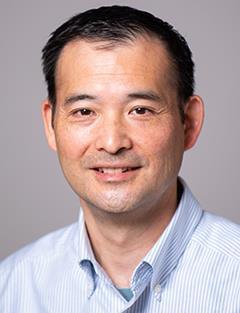-
About
- Departments & Offices
-
Academics
- Public Health
- Biomedical Sciences
- Physician Assistant
- Special Master’s (MBS)
-
Admissions & Financial Aid
- Tuition & Fees
-
Student Experience
-
- Student Resources by Program
- Academic & Student Support
- Wellness & Wellbeing
- Student Life
- Events & Traditions
-
-
Research
- Research Labs & Centers
- Tufts University-Tufts Medicine Research Enterprise
-
Local & Global Engagement
- Pathway & Enrichment Programs
- Global Health Programs
- Community Engagement

Peter Juo

Research/Areas of Interest
Our laboratory is interested in identifying genes and molecular mechanisms involved in the targeting and turnover of synaptic proteins. We use a combination of genetics, biochemistry, in vivo fluorescence imaging and behavior to study the localization and regulation of postsynaptic neurotransmitter receptors. Understanding the molecular mechanisms involved in localizing and regulating synaptic proteins will reveal how synapses are built during development (synaptogenesis), and regulated in the mature nervous system during learning and memory. Studies revealing the function of proteins at normal synapses will provide the foundation for understanding the molecular basis of aberrant synaptic transmission observed in various neurodevelopmental and neuropsychiatric diseases including Autism Spectrum Disorders (ASDs), Intellectual Disability (ID), Alzheimer's Disease (AD) and Schizophrenia.
Education
- Doctor of Philosophy, Harvard University, USA, 1999
- Master of Science, Harvard University, USA, 1995
- Bachelor of Science, Texas A&M University, USA, 1993
Biography
I am interested in understanding the cell biological mechanisms that regulate glutamatergic synapse development and function. In particular, we are interested in mechanisms that regulate the trafficking and turnover of glutamate receptors (GluRs) at synapses. We use a combination of genetic, biochemical and imaging approaches to study GluR trafficking and synapse development in vivo using the genetically tractable nematode C. elegans. I am dedicated to mentoring and training graduate students, postdoctoral fellows, and undergraduate students. Since starting my laboratory, I have trained (including present trainees) 5 postdoctoral fellows, 6 Ph.D. thesis students, 2 MD-Ph.D. students, 24 undergraduate students and 3 high school students. The 4 postdoctoral fellows that have completed training in my lab have all successfully obtained tenure-track Assistant Professor positions. Additionally, I have mentored 24 graduate students during their rotations, 7 Masters in Biomedical Sciences (MBS) literature thesis students and 2 MBS research thesis students, and served on 44 Ph.D. thesis advisory committees. I served as the graduate student Program Advisor from 2010-2012 and received the student-nominated Outstanding Graduate Biomedical School Faculty Mentor Award in 2011. I am currently the Director of the Master's in Biomedical Research (MBR) graduate program and the Director of Admissions for the Genetics, Molecular and Cellular Biology (GMCB) graduate program.